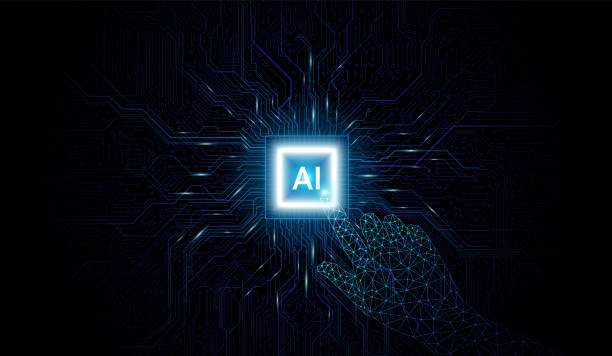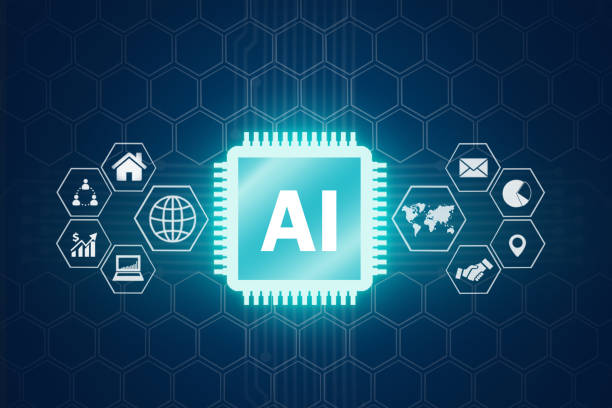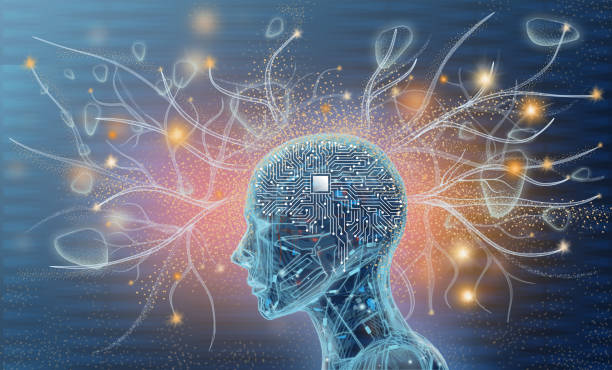What is Artificial Intelligence? Definitions and Basic Concepts

#Artificial_Intelligence (AI) is a branch of computer science that seeks to build machines capable of performing tasks that currently require human intelligence.
This broad definition includes a wide range of techniques and approaches, from simple expert systems to complex neural networks that can learn and adapt.
In general, artificial intelligence refers to the ability of a computer system to mimic or simulate human intelligence.
This imitation can include learning, reasoning, problem-solving, perception, and natural language understanding.
Understanding the concept of artificial intelligence requires familiarity with its main sub-branches.
Machine Learning is one of the most important of these sub-branches, which allows machines to learn from data without explicit programming.
Machine Learning itself includes various types, including supervised learning, unsupervised learning, and reinforcement learning.
Natural Language Processing allows machines to understand and generate human language.
Computer Vision allows machines to understand and interpret images.
Robotics deals with the design and construction of robots that can perform physical tasks.
The ultimate goal of artificial intelligence is to create machines that can think, decide, and act independently.
This ambitious goal presents many technical and ethical challenges.
However, recent advances in artificial intelligence, such as the development of deep neural networks and the increasing processing power of computers, show that this goal is not out of reach.
Ultimately, understanding what artificial intelligence is requires accepting the fact that this field is rapidly evolving and its exact definition may change over time.
Did you know that 85% of customers check your company’s website before any interaction?
Build a corporate website worthy of your credibility with Rasaweb.
✅ Increase customer credibility and trust
✅ Attract high-quality leads
⚡ Get free website design consultation
The History of Artificial Intelligence from Beginning to Today

The history of artificial intelligence dates back to the 1950s, when researchers began exploring the possibility of building machines that could think.
One of the early milestones was the Dartmouth Conference in 1956, which is considered the official beginning of the field.
At this conference, leading researchers such as John McCarthy, Marvin Minsky, and Claude Shannon gathered to discuss the possibility of building intelligent machines.
The 1960s and 1970s were a period of early optimism in artificial intelligence.
Researchers succeeded in creating programs that could solve simple math problems, play chess, and understand natural language.
However, these successes came with serious limitations.
AI programs at that time were often fragile and could not adapt well to more complex problems.
The 1980s saw the emergence of expert systems, which were programs that contained specialized knowledge in a particular domain.
Expert systems achieved successes in some areas such as medicine and engineering, but still had their limitations.
The 1990s were another period of stagnation in artificial intelligence, due to lack of funding and lack of significant advances in technology.
However, in the late 1990s and early 2000s, with the advent of the Internet and the increasing volume of available data, interest in artificial intelligence was revived.
Today, artificial intelligence is experiencing a renaissance.
Recent advances in machine learning, especially deep neural networks, have led to dramatic advances in areas such as computer vision, natural language processing, and robotics.
Deep learning allows machines to identify complex patterns in data and perform tasks that previously seemed impossible.
Artificial intelligence is now used in a wide range of applications, including self-driving cars, virtual assistants, facial recognition systems, and online recommendation algorithms.
Applications of Artificial Intelligence in Various Industries

Artificial intelligence (AI) is fundamentally transforming various industries, offering a wide range of applications that increase productivity, accuracy, and efficiency.
In #healthcare, artificial intelligence plays an important role in diagnosing diseases, developing drugs, and providing personalized care.
Machine learning algorithms can analyze medical images and detect patterns that may not be visible to human doctors.
Artificial intelligence also plays a role in the development of new drugs, in that it can screen millions of chemical compounds and identify compounds that are likely to be effective in treating diseases.
In the #finance industry, artificial intelligence is involved in fraud detection, risk management, and customer service.
Machine learning algorithms can analyze financial transactions and identify patterns that indicate fraud.
Artificial intelligence also plays a role in risk management, as it can analyze market data and identify potential risks.
In the #manufacturing industry, artificial intelligence is involved in process automation, quality control, and predictive maintenance.
Robots equipped with artificial intelligence can perform repetitive and dangerous tasks, while machine learning algorithms can control the quality of products and identify potential problems before they occur.
In the #transportation industry, artificial intelligence is involved in the development of self-driving cars, route optimization, and traffic management.
Self-driving cars use sensors and artificial intelligence algorithms to understand their surroundings and move safely on the roads.
Artificial intelligence algorithms can also optimize routes and manage traffic to reduce travel time and increase efficiency.
These are just a few examples of the applications of artificial intelligence in various industries.
As technology advances, artificial intelligence is expected to play an even more important role in our lives.
| Industry | Application |
|---|---|
| Healthcare | Disease diagnosis, drug development, personalized care |
| Finance | Fraud detection, risk management, customer service |
| Manufacturing | Process automation, quality control, predictive maintenance |
| Transportation | Self-driving cars, route optimization, traffic management |
Challenges and Limitations of Artificial Intelligence

Despite the dramatic advances in artificial intelligence, this field faces significant challenges and limitations.
One of the most important challenges is ethical_issues.
Artificial intelligence algorithms can be discriminatory if the data they are trained on contains bias.
This can lead to unfair decision-making in areas such as hiring, lending, and criminal justice.
Another challenge is interpretability.
Many artificial intelligence algorithms, especially deep neural networks, are black boxes that are difficult to understand how they make decisions.
This can be problematic because if we cannot understand why an algorithm has made a particular decision, we cannot trust it.
Security issues are also a major challenge for artificial intelligence.
Artificial intelligence algorithms can be vulnerable and attacked.
For example, attackers can manipulate input data to deceive the algorithm and cause it to make wrong decisions.
In addition, artificial intelligence can be used for malicious purposes, such as creating autonomous weapons or spreading misinformation.
Technical limitations are also a challenge for artificial intelligence.
Artificial intelligence algorithms often require a large amount of data and processing power to work well.
This can make access to artificial intelligence difficult for organizations and individuals with limited resources.
In addition, artificial intelligence is still limited in some areas such as natural language understanding and logical reasoning.
Finally, job automation is a social challenge of artificial intelligence.
As artificial intelligence advances, many jobs are expected to be automated, which could lead to job losses and increased inequality.
Addressing these challenges requires joint efforts from researchers, policymakers, and society as a whole.
Isn’t your online sales as you expect? With Rasaweb, solve the problem of low sales and poor user experience forever!
✅ Increase visitor-to-customer conversion rate
✅ Create a pleasant user experience and increase customer trust
⚡ Act now to receive free consultation!
The Future of Artificial Intelligence: Predictions and Possibilities

The future of artificial intelligence is full of potential and uncertainty.
It is predicted that artificial intelligence will play an increasing role in our lives in the coming decades and will create profound transformations in various industries.
One of the most important predictions is the development of Artificial_General_Intelligence (AGI), which is a type of artificial intelligence that can perform any intellectual task that a human can do.
If AGI is achieved, it could have a huge impact on society and lead to dramatic advances in science, technology, and economics.
However, the development of AGI comes with significant technical and ethical challenges.
Some researchers believe that AGI will never be achieved, while others believe that it is possible in the coming decades.
Regardless of whether AGI is achieved or not, artificial intelligence is already changing the world.
It is predicted that artificial intelligence will create huge transformations in areas such as healthcare, transportation, and manufacturing.
For example, artificial intelligence can help doctors diagnose diseases more accurately, self-driving cars can reduce traffic accidents, and robots equipped with artificial intelligence can optimize production processes.
However, the development of artificial intelligence also comes with risks.
If artificial intelligence is not managed properly, it could lead to job losses, increased inequality, and even war.
Therefore, it is essential to proceed with caution and responsibility in the development and use of artificial intelligence.
Ultimately, the future of artificial intelligence depends on the choices we make today.
If we can develop artificial intelligence in a way that benefits everyone, we can create a better and fairer world.
Artificial Intelligence in Iran: Current Status and Prospects

Artificial intelligence (AI) in Iran is also considered an important and growing field.
In recent years, significant efforts have been made to develop artificial intelligence in the country, including investment in research and development, training of specialized human resources, and support for startup companies.
Currently, artificial intelligence in Iran is used in various fields such as healthcare, industry, agriculture, and services.
For example, in the healthcare field, artificial intelligence algorithms are used for disease diagnosis, analysis of medical images, and provision of personalized care.
In the industry sector, robots equipped with artificial intelligence are used for automation of production processes, quality control, and predictive maintenance.
In the agriculture sector, artificial intelligence algorithms are used to optimize irrigation, diagnose plant diseases, and predict crop yields.
In the service sector, chat-bots equipped with artificial intelligence are used to provide customer service, answer questions, and conduct transactions.
However, the development of artificial intelligence in Iran also faces challenges, including a shortage of specialized human resources, a lack of financial resources, and legal and regulatory obstacles.
To address these challenges, the Iranian government has implemented various programs to support the development of artificial intelligence in the country, including providing financial facilities, establishing innovation centers, and developing international cooperation.
The outlook for artificial intelligence in Iran is bright.
Given the efforts made and the existing potentials, artificial intelligence is expected to play a more important role in the Iranian economy and society in the coming years.
The Impact of Artificial Intelligence on Jobs and the Labor Market

Artificial intelligence (AI) has a profound impact on jobs and the labor market.
On the one hand, artificial intelligence can automate many jobs, which can lead to job losses and increased inequality.
On the other hand, artificial intelligence can create new jobs and increase productivity and efficiency, which can lead to economic growth.
The impact of artificial intelligence on jobs depends on the type of job and its degree of automatability.
Jobs that are repetitive, routine, and rules-based are more susceptible to automation.
For example, jobs such as telephone operators, office workers, and truck drivers may be fully or partially automated by artificial intelligence.
On the other hand, jobs that require creativity, problem-solving, and human interaction are less susceptible to automation.
For example, jobs such as doctors, engineers, and teachers are more likely to be augmented by artificial intelligence than replaced.
In addition, artificial intelligence can create new jobs that did not previously exist.
For example, artificial intelligence developers, data scientists, and cybersecurity experts are among the jobs that have emerged as a result of advances in artificial intelligence.
To adapt to the impact of artificial intelligence on the labor market, individuals need to learn new skills and prepare themselves for new jobs.
Skills such as critical thinking, problem-solving, creativity, and collaboration will become more important in the world of work in the future.
Also, governments and organizations should adopt policies to support individuals in transitioning to new jobs and provide the necessary training to learn new skills.




